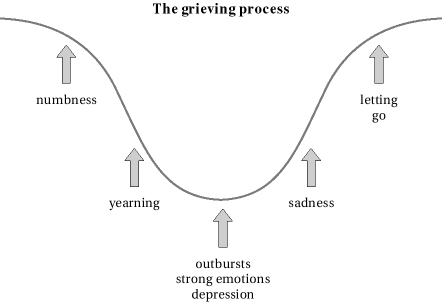David Baxter PhD
Late Founder
Prolonged Grief Disorder (PGD)
By Dr. Deborah Serani
August 8, 2009

Recent research has psychometrically validated the criteria for Prolonged Grief Disorder (PGD) - a disabling intense state of grief that persists for months, sometimes years. Though not a recognized mental disorder in the DSM-IV-TR and ICD-10, inclusion could become a reality with the upcoming DSM V and ICD-11.
I have worked with a few individuals whose significant bereavement would fall into this category. Unable to move forward, paralyzed by the loss and grieving deeply, these individuals were often chastised by family and friends for "not getting on with it already." Often, friends and family don't realize that such statements are hurtful.
The inclusion of PGD as a recognized disorder would bring credibility to this specific grieving process. With it, too, would come ways to deal with the disorder. Dr. David Kessler, Grief and Loss Specialist for Tributes.com offers the best and the worst things to say to someone in this grief state :
The Worst Things to Say:
The Best Things to Say:
Prigerson, H., Horowitz, M., Jacobs, S., Parkes, C., Aslan, M., Goodkin, K., Raphael, B., Marwit, S., Wortman, C., Neimeyer, R., Bonanno, G., Block, S., Kissane, D., Boelen, P., Maercker, A., Litz, B., Johnson, J., First, M., & Maciejewski, P. (2009). Prolonged Grief Disorder: Psychometric Validation of Criteria Proposed for DSM-V and ICD-11. PLoS Medicine, 6 (8)
By Dr. Deborah Serani
August 8, 2009

Recent research has psychometrically validated the criteria for Prolonged Grief Disorder (PGD) - a disabling intense state of grief that persists for months, sometimes years. Though not a recognized mental disorder in the DSM-IV-TR and ICD-10, inclusion could become a reality with the upcoming DSM V and ICD-11.
I have worked with a few individuals whose significant bereavement would fall into this category. Unable to move forward, paralyzed by the loss and grieving deeply, these individuals were often chastised by family and friends for "not getting on with it already." Often, friends and family don't realize that such statements are hurtful.
The inclusion of PGD as a recognized disorder would bring credibility to this specific grieving process. With it, too, would come ways to deal with the disorder. Dr. David Kessler, Grief and Loss Specialist for Tributes.com offers the best and the worst things to say to someone in this grief state :
The Worst Things to Say:
- At least she lived a long life, many people die young.
- He is in a better place.
- She brought this on herself.
- There is a reason for everything.
- Aren’t you over him yet? He has been dead for a while now.
The Best Things to Say:
- I am so sorry for your loss.
- I wish I had the right words, just know I care.
- I don’t know how you feel, but I am here If can help in anyway.
- You and your loved one will be in my thoughts.
- My favorite memory of _________ is _________
Prigerson, H., Horowitz, M., Jacobs, S., Parkes, C., Aslan, M., Goodkin, K., Raphael, B., Marwit, S., Wortman, C., Neimeyer, R., Bonanno, G., Block, S., Kissane, D., Boelen, P., Maercker, A., Litz, B., Johnson, J., First, M., & Maciejewski, P. (2009). Prolonged Grief Disorder: Psychometric Validation of Criteria Proposed for DSM-V and ICD-11. PLoS Medicine, 6 (8)
